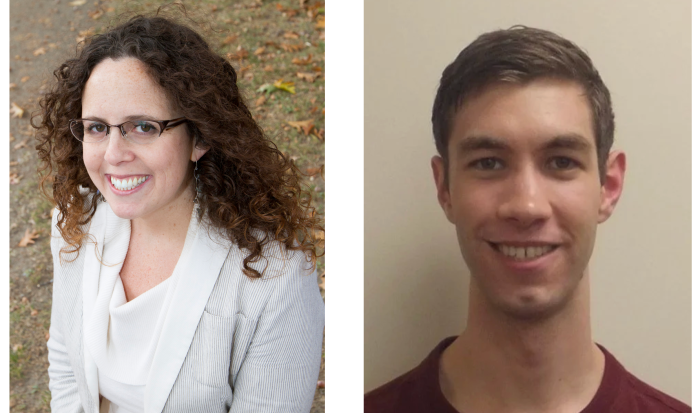
Psi Beta had a busy April, inducting new students to the Honor Society and, along with the Psychology Club, hosting two engaging talks for the QCC community.
On April 29, Angelica Araujo, Deanna Kelsaw, Erin Murphy, Nguyen Son Tung Truong and Tyler Wills were all inducted into the Psi Beta Honor Society, which encourages professional development and psychological literacy for students at two-year colleges through promotion and recognition of excellence in scholarship, leadership, research and community service.
Shining a Light on Mental Illness in Young People
Dayna Altman shared a powerful and deeply personal story about her ongoing journey with mental health challenges at a recent presentation. Altman's effusive personality is bubbly and outgoing, yet her candid talk showed that mental illness can impact anyone, even those who seem to have it all together on the outside.
Growing up in a privileged community, Altman experienced intense pressure to be perfect - beautiful, smart, talented and successful. However, her struggles with anxiety, depression and an eating disorder began at a young age.
"I thought I would feel 'whole' if I was beautiful enough, smart enough, good enough. I was looking for external validation to confirm that I was enough," she revealed.
She also put massive pressure on herself to go to a "good" college and would engage in obsessive behaviors like sharpening pencils every night to manage the anxiety she was feeling.
When she did eventually start college, her experience included rejection, panic attacks and sexual assault. She commented on how alone she felt, yet later learned that many college students experience mental illness.
Despite the struggles she faced during her time in higher education, she also made many positive connections through close friendships and finding community through clubs and activities. After joining the dance club at her college, Altman formed a relationship with another member who eventually became her mentor. Her mentor had an eating disorder too and showed Altman that mental health support could be much more than a once a week therapy appointment.
Throughout her treatment, Altman was diagnoses with generalized anxiety disorder, depression, an eating disorder and eventually obsessive compulsive disorder. Her healing journey included intensive treatment programs, medication, and ongoing therapy. She has been hospitalized for her mental health struggles and even grappled with suicidal thoughts at times.
"Asking someone if they're struggling with their safety could be a lifeline," Altman emphasized.
Altman has come to terms with the fact that her mental healthy journey will be everchanging. But she has gained invaluable tools that allow her to survive and thrive. Advocacy is one of the tools she developed to find her voice and help others. She orchestrated events to support survivors of domestic violence and sexual assault, started a non-profit to raise awareness about eating disorders and has worked as a mental health advocate. She published a cookbook, Bake It Til You Make It, which includes her life experiences and coping strategies, in addition to recipes.
"It's my superpower to share my story," she stated.
Altman left the audience with four key messages of hope: It's never too early or late to get help; everyone's story matters; things do get better; and you're not alone. She encouraged using resources like 988 Lifeline for support. Breaking the silence around mental health could truly save lives.
The Mind Unleashed: Novel Brain-Driven Interaction Paradigms
Chris Micek, a Ph.D. student from Worcester Polytechnic Institute, along with WPI Associate Professor of Computer Science Dr. Erin Solovey, showcased their work on brain data and human interaction with technology.
Micek described their research as a promising and interdisciplinary effort that combines computer science with social science to improve the way people interact with digital systems, especially brain-computer interfaces. Brain-computer interfaces have been used in clinical and medical settings for some time, but are now becoming part of a broader landscape that have potential to improve our memory, mobility, decision-making skills and learning.
Methods such as functional magnetic resonance imaging (fMRI), electroencephalography (EEG) and functional near-infrared spectroscopy (fNIRS) all measure brain activity through either electrical activity or oxygenation of the blood. These tools have been used to do things like move a remote arm with only brain activity, detect over stimulation while multitasking and adapt lessons to focus on areas that need more or less attention.
According to Micek, it's not easy to translate brain data, which can often look like a mess of indistinguishable lines, especially without a background in neuroscience, biomedical signal processing or machine learning. Which is why groups at places such as WPI having been developing systems to make this field more accessible.
WPI developed a platform called BrainEx that makes visualizing and exploring brain much easier. Another option is PhysioLabXR, which is an open source of brain data that anyone can browse.
Micek and others are also working on tutoring systems that use this technology to detect which areas a person is struggling with but allow for realistic environments. When someone is pausing on a problem, is it because their mind is wandering or because they are working to solve the problem? With more data, they will hopefully find out.
Their second project is a user-centered study that's goal is to support people working together in creative teams. By simultaneously recording brain activity from multiple people who are working on a project, such as designing an escape room, Micek and other are hoping to gather brain data that will inform better collaboration and performance.
For more information on Psi Beta contact Valarie Clemente at vclemente@qcc.mass.edu.
